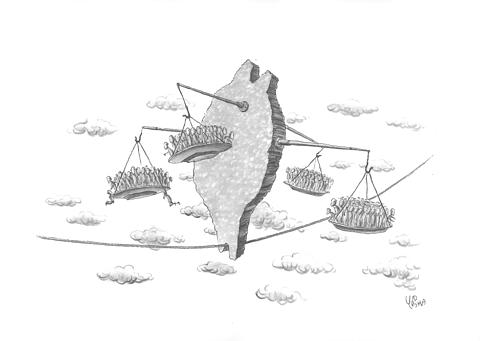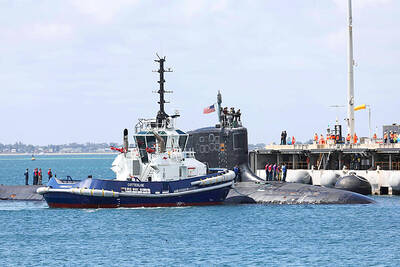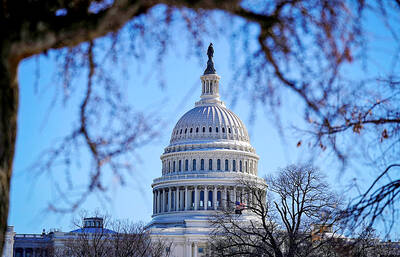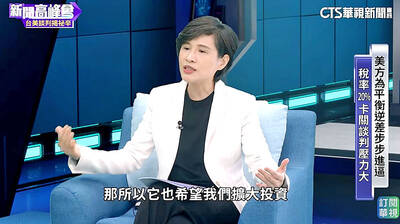Chen Shui-bian (
Chen Shui-bian has repeatedly been underestimated by skeptics in Taiwan and around the world. He is neither an ideologue nor a demagogue. He is a pragmatic politician -- not without strong beliefs and principles, but open to the realities and possibilities of the world, and concerned to be effective. Most of all, at age 49, he is a work in progress. He continues to grow. Witness his remarkable pledge on the final night of his campaign to "step out of participation in all DPP party activities and become a president who can look beyond party and ethnic lines."
Over the past year, Chen Shui-bian has come to understand that any move toward Taiwan independence would be suicidal, and he has modified his stance accordingly. On election night, he reached out to the leaders of the PRC with hopeful and accommodating words. But words of friendship will not be nearly enough to move cross-strait relations back from the brink of open military confrontation. If any resumption of dialogue is to be possible, and if he is to find success in forging a broad, multiparty consensus on Taiwan's position, Chen will have to continue evolving. Reducing the now very dangerous level of tension across the strait will not require abandonment of Taiwan's most vital interest -- preserving the country's sovereignty, dignity and democracy. But it will require Chen and his administration to take several more steps toward moderation.

Some of these should still be steps of forbearance. Beijing would no doubt see any effort to abandon the National Unification Guidelines or to change the name of the Mainland Affairs Council as provocative and destabilizing. Chen will have to resist the temptation to tinker with this broad architecture. He should not give the hardliners in Beijing any justification, however modest, for their fears that he is bent on Taiwan independence. For that same reason, he should quietly drop reference to Lee Teng-hui's (
Most of all, President Chen must find some rhetorical olive branch to offer China on the "one China" principle. Words are important for all sides in this conflict, and Chen, aided by an array of innovative advisors (new and old), must reach for a fresh concept that can bridge the biggest gulf in the conflict, that between his own historically pro-independence constituency and the ferociously anti-independence hardliners in China. That concept could involve acceptance of the notion of a single Chinese people, bound by a common culture, history and language. Accepting this "one China" could show Chen's good faith in wanting to negotiate and his sincerity in pledging not to move Taiwan toward independence. It could provide a face-saving climate for the communist Chinese leadership to agree to resume negotiations, and it could plant the seed for some future interim agreement featuring a Chinese cultural "commonwealth" as the one manifestation of "one China" that the two sides could agree upon for the time being.
As was evident from Chen's four years as mayor of Taipei, he seeks results. He is not content to merely "reign," he wants to govern, to be effective. But to be effective as president, he will have to move further beyond the moderate and restrained stance on cross-strait relations he has fashioned in the campaign. He will need to make an important rhetorical or symbolic concession, and to use his consummate political skills to bring his constituency along, and to forge a national consensus.
There is more at stake than avoiding imminent war. If President Chen avoids actively provocative words and deeds, he will avoid war in the short run. But forbearance alone will not bring China to the negotiating table -- not on political issues, and probably not on the three direct links either. Word has it that the hardliners in the military and the Communist Party are delighted with Chen's victory, because it gives the lie to China's moderates who keep insisting that the conflict with Taiwan can be resolved through negotiations. In the coming months, Chen must find some way to reach out to China's moderates and to facilitate the resumption of a serious dialogue, otherwise short-term peace could be purchased at the price of a longer-term slide toward war.
There is also a pressing domestic reason for a creative and proactive cross-strait policy. Chen Shui-bian's success as president depends not only on avoiding war with China but on pushing ahead with an ambitious agenda for political and economic reform. These reforms to prosecute organized crime, and to reform the judiciary and the banking system, as well as other institutions, will require precious political capital. President Chen -- and his premier and cabinet -- must not only husband political capital for these difficult battles, they must first accumulate more of it. This cannot be done if the country remains deeply divided on the cross-strait question.
Complete consensus is not possible. But the current mutual distrust and division must be narrowed. This can only happen in domestic politics if Chen embraces further moderation on cross-strait relations, accepting some notion of a one-China principle and keeping the door open to eventual reunification (even if the ultimate form of that political union might be very loose and many decades away).
In tone, and even in some specifics (such as pursuit of direct transportation, trade and communication links), such a cross-strait posture would be more moderate and pragmatic than Lee Teng-hui's policy. Critics would complain that it was moving Taiwan away from independence. But that is the point. Taiwan has sovereignty, prosperity and security today. But its security is slipping, and if it blows up in a war, so will its economy, and quite possibly its democracy. Only Chen can sell Taiwan's pro-independence public on a cultural "one China," just as only Nixon could have sold America's anti-communist public on normalizing relations with "Red China." And only by doing so can President Chen realize the great, historic mission of his shattering election victory, which is not only to preserve Taiwan's sovereignty and security, but to deepen, dignify, and invigorate its democracy.
Larry Diamond is a Senior Research Fellow at the Hoover Institution, Stanford University. He is a special presidential election analyst for the Taipei Times.

CSBC Corp, Taiwan (台灣國際造船) yesterday released the first video documenting the submerged sea trials of Taiwan’s indigenous defense submarine prototype, the Hai Kun (海鯤), or Narwhal, showing underwater navigation and the launch of countermeasures. The footage shows the vessel’s first dive, steering and control system tests, and the raising and lowering of the periscope and antenna masts. It offered a rare look at the progress in the submarine’s sea acceptance tests. The Hai Kun carried out its first shallow-water diving trial late last month and has since completed four submerged tests, CSBC said. The newly released video compiles images recorded from Jan. 29 to

DETERRENCE EFFORTS: Washington and partners hope demonstrations of force would convince Beijing that military action against Taiwan would carry high costs The US is considering using HMAS Stirling in Western Australia as a forward base to strengthen its naval posture in a potential conflict with China, particularly over Taiwan, the Wall Street Journal reported on Saturday. As part of its Indo-Pacific strategy, Washington plans to deploy up to four nuclear-powered submarines at Stirling starting in 2027, providing a base near potential hot spots such as Taiwan and the South China Sea. The move also aims to enhance military integration with Pacific allies under the Australia-UK-US trilateral security partnership, the report said. Currently, US submarines operate from Guam, but the island could

RESTRAINTS: Should China’s actions pose any threat to Taiwan’s security, economic or social systems, China would be excluded from major financial institutions, the bill says The US House of Representatives on Monday passed the PROTECT Taiwan Act, which states that Washington would exclude China from participating in major global financial organizations if its actions directly threaten Taiwan’s security. The bill, proposed by Republican Representative Frank Lucas, passed with 395 votes in favor and two against. It stipulates that if China’s actions pose any threat to Taiwan’s security, economic or social systems, the US would, “to the maximum extent practicable,” exclude Beijing from international financial institutions, including the G20, the Bank for International Settlements and the Financial Stability Board. The bill makes it clear that China must be prepared

Taiwanese trade negotiators told Washington that Taipei would not relocate 40 percent of its semiconductor production to the US, and that its most advanced technologies would remain in the nation, Vice Premier Cheng Li-chiun (鄭麗君) said on Sunday. “I told the US side very clearly — that’s impossible,” Cheng, who led the negotiation team, said in an interview that aired on Sunday night on Chinese Television System. Cheng was referring to remarks last month by US Secretary of Commerce Howard Lutnick, in which he said his goal was to bring 40 percent of Taiwan’s chip supply chain to the US Taiwan’s almost